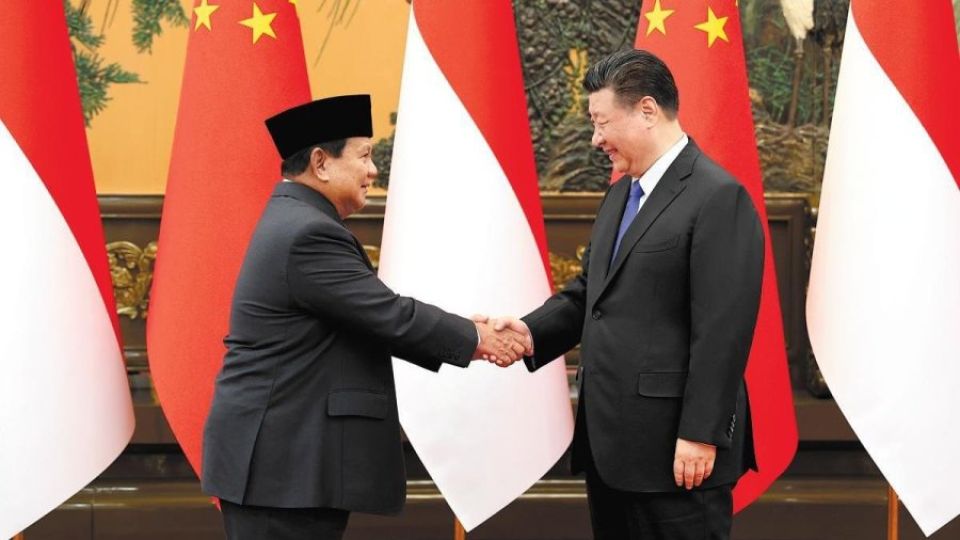November 20, 2024
JAKARTA – Indonesia aims to enhance “good neighborliness” through its new joint development plan with China, the Foreign Ministry said on Sunday, assuring it will not compromise legal rights or jurisdiction in waters adjacent to a contested sea.
The remark follows President Prabowo Subianto’s recent assertion that “partnerships are better than conflicts,” amid fears Indonesia could back China’s broad claims in the South China Sea over other Southeast Asian jurisdictions.
On Nov. 9, following Prabowo’s first meeting with China’s President Xi Jinping after inauguration, Indonesia and China stated they had reached a common understanding “on joint development in areas of overlapping claims”.
That wording raised concerns in Indonesia, with analysts warning it could signal a shift from Jakarta’s non-claimant stance and jeopardize its exclusive resource rights.
But speaking from Peru on the sidelines of Prabowo’s trip, a senior ministry official insisted that Indonesia maintained its long-standing position on China’s claim, and that any further speculation “should not go beyond” the expressly written intent to explore new avenues of cooperation.
“The document outlines that the two parties will establish an intergovernmental committee to explore the cooperation and its modalities,” said Abdul Kadir Jailani, the director-general for Asia, Pacific and Africa affairs.
“This means that the details, including the geographic scope of the cooperation, will be determined later by the committee,” he told The Jakarta Post on Sunday, without offering a clear timeline for its establishment.
The Chinese Embassy in Jakarta did not respond to a request for comment.
Read also: Philippines says China is pushing it to cede claims in South China Sea
‘Spirit’ of cooperation
The statement was issued weeks after a Chinese coast guard ship repeatedly disrupted a scientific survey for state oil and gas firm Pertamina in the North Natuna Sea, part of Indonesia’s exclusive economic zone (EEZ) that holds vast natural gas reserves and fisheries potential.
Chinese grey hulls and fishing boats occasionally trespass into Indonesia’s waters adjacent to the South China Sea, with Beijing claiming they were operating in “traditional” fishing grounds.
But China’s argument based on old map markings was invalidated in 2016 after an arbitral court ruled that it had no basis in international law, particularly the 1982 United Nations Convention on the Law of the Sea (UNCLOS).
Kadir said China’s claim “undermines” UNCLOS, but that the proposed joint development cooperation with Beijing was made “in the spirit of” the 2002 Declaration of Conduct in the South China Sea (DoC), which underpins engagement in the absence of border agreements.
“The President has on various occasions suggested that these kinds of cooperation serve as an example of friendly and harmonious relations that make the South China Sea a sea of peace, stability and prosperity,” he explained.
But international law experts insist that Indonesia’s rationale still leads to more questions than answers.
I Made Andi Arsana, a Gadjah Mada University researcher specializing in maritime boundary delimitation, argued that not even the protective clauses provided negate the implications of acknowledging overlapping claims with China, however implicit the case.
“This newfound acknowledgment may erode Indonesia’s reputation as a regional leader and mediator, undermining its diplomatic standing in ASEAN and beyond,” Andi told the Post on Monday.
Furthermore, Indonesia must first gather sufficient data on the economic potential of areas considered for joint development before pursuing new cooperation, Andi said.
“It’s also crucial to identify overlapping claims, […] allowing Indonesia to set priorities and allocate resources effectively,” he added.
Others urge more action.
Andreas Salim, program director for maritime security at the Indonesia Ocean Justice Initiative (IOJI), suggested that Prabowo follow in the footsteps of his Filipino counterpart, Ferdinand Marcos Jr, who once rescinded a supposed “gentleman’s agreement” with China.
“Now is the best time to push for the removal of the ‘overlapping claim’ phrase, as it is currently part of a non-binding document,” he said on Monday.
The debacle comes off the back of the President’s first high-profile visits to China and the United States, two superpowers competing for clout in a fast-growing region.
Prabowo highlighted in remarks to reporters following his meeting with US President Joe Biden that Indonesia would “respect all powers” but also “safeguard our sovereignty” as part of his non-aligned foreign policy.
According to a joint statement with the US issued on Nov. 12, both sides “recognized the importance of the full and effective implementation” of the DoC and backed efforts to develop a Code of Conduct in the South China Sea (CoC) that “respects the rights and interests of third parties”.
Critics have bemoaned how China has kept moving the goal posts in ASEAN’s efforts to conclude the CoC – a key protocol to prevent conflict in areas of overlapping claims.
But Kadir insisted that the Indonesia-US joint statement “simply reaffirms Indonesia’s established position”.


